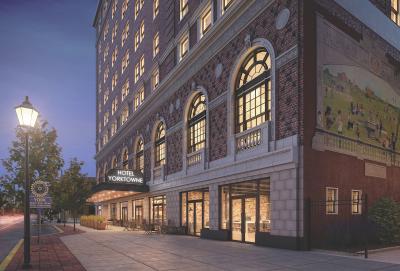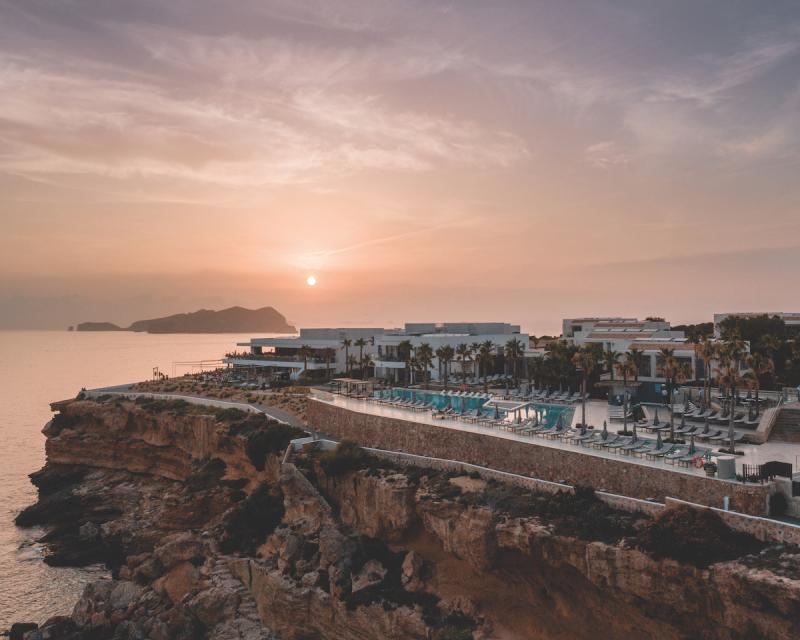Like savvy antiques hunters, major hotel companies are continuing to aggressively build their collections of soft brands, ferreting out interesting and uniquely concepted properties that hold out the promise of increased value to their overall portfolios in the long term.
The sector is composed largely of independent properties in the boutique/lifestyle space that have affiliated with a hotel chain, through which they enjoy increased visibility via robust distribution, sales and marketing efforts, loyalty programs and tech and communications platforms. While such properties typically retain their operating identities, almost all take on some brand descriptor and corporate pedigree tag, which brings benefits in terms of buying power and cost control.
Hilton Sees Strength in Soft Brands
For example, in 2014 the Curio Collection by Hilton launched with the opening of The Highland Dallas across from Southern Methodist University. In the past decade, the upper-upscale, full-service collection has grown to 138 hotels, with 77 in the pipeline (as of first quarter 2023).
Three years later, the mega-chain created another niche, Tapestry Collection by Hilton, and opened Hotel Skyler Syracuse in a 1920s building in upstate New York. And like its soft-brand sibling, Tapestry has grown to 101 properties, with 107 in the pipeline as of Q1 2023. The company also includes luxury-level LXR Hotels and Resorts, launched in 2018, within its soft-brand portfolio.
Together, the soft brands represent 3.5 percent of Hilton’s overall portfolio.

According to Jenna Hackett, global brand leader, Curio and Tapestry Collections by Hilton, owners with a story to tell and an authentic guest experience to offer “are excited by this model” and their enthusiasm for independent/chain synergies has allowed Hilton to advance into new and higher-barrier-to-entry markets, such as in the Galapagos, where it has opened Royal Palm Galapagos, Curio Collection by Hilton.
“Hard brands have certain requirements for key count and other attributes that make it challenging for owners to build in some destinations,” she noted. “Collections have the unique opportunity to provide boutique experiences in highly coveted getaway locations, such as European city centers and resort destinations.”
Exotic locations are a distinct drawing card as well for consumers looking for that Instagrammable travel experience, which also has helped fuel soft-brand growth. For instance, there’s the newly added Lindian Village Beach Resort Rhodes, Curio Collection by Hilton, a 188-room hotel near Lindos, Greece, that has a private beach, multiple dining options and a spa. The Tapestry Collection’s latest addition is The Mermoon Resort Hainan Tufu Bay, a 116-room property with a mermaid-tail-shaped pool on Hainan Island, sometimes called “China’s Hawaii.”
This August, the first Curio Collection hotel opened in East Africa. Set at the edge of the Karura Forest, the Kwetu Nairobi has 102 guestrooms across five interconnected spaces—each with a private butler—that offer a variety of themes and designs. The openings reflect the increased pace of growth for the Collection brands, which Hackett said increased during the pandemic, particularly for the Tapestry Collection.
“In March 2020, we operated 33 Tapestry Collection hotels, and then opened 69 hotels from 2020-2023, celebrating our 100th opening in first-quarter 2023,” Hackett said. “Being under the umbrella of an established brand like Hilton can help ease operations for owners, which is especially relevant to many independent hotels after the challenges the industry has faced over the past couple of years.”
Hyatt’s Three
Like Hilton, Hyatt has three soft-brand offerings: The Unbound Collection by Hyatt (upper-upscale to luxury), Destination by Hyatt (upper-upscale to luxury) and JdV by Hyatt (upscale to upper-upscale), the latter two the result of acquisitions in 2018 and subsequent rebrandings. The trio had 39, 16 and 58 properties open, respectively, at the end of Q1 2023, representing approximately 9 percent of Hyatt’s total properties.

Katie Johnson, VP and global brand leader of Hyatt’s Independent Collection, which includes the soft brands, said the chain over the past several years has seen significant interest in the independent lifestyle space from owners, developers and investors. “For most hoteliers, the draw of soft brands is the custom identity, personal touch and commitment to service that offers a one-of-a-kind guest experience,” she said.
Johnson acknowledged while Hyatt is smaller than its largest competitor, “we punch above our weight when it comes to working with owners and having a hands-on approach.” She noted continued growth is coming from a mix of its development team seeking out the right deals as well as owners, investors and developers seeking out the chain specifically.
“Our goal is to have the best—not necessarily the biggest—brands that attract consumers who appreciate authenticity, consistency and experiences that are more reflective of them and the values they uphold,” said Johnson.
Hyatt is expanding Independent Collection brands in key global destinations through new openings and agreements. Among openings in 2022 were the 59-key Magma Resort Santorini (Unbound) in Greece, 185-suite 7Pines Resort Ibiza (Destination) in Spain and Grayson Hotel (Unbound) New York City. Opened earlier this year were the 147-key FirstName Bordeaux (JdV) in France, 127-key The Pell (JdV) in Rhode Island and the 100-plus-key Schloss Roxburghe Hotel (Destination) in Scotland.
The Unbound Collection will get the Kennedy 89 hotel in Frankfurt, Germany, next April and the Hotel Toranomon Hills is slated to open at year-end 2023 in Tokyo.
The VP noted the chain’s global brand footprint and focus on luxury experiences has enabled the Independent Collection to also develop strong relationships with international brands and introduce new hotels, such as Fuji Speedway Hotel, opened in 2022 in Shizuoka, Japan; FILA House, slated to open in Shanghai next year; and the Hello Kitty Hotel, set to open in 2025 in Sanya, Hainan, China.
The Independent Collection got another boost this year when Hyatt closed on its acquisition deal for Dream Hotel Group, whose Chatwal and Unscripted brands transitioned to Hyatt’s Unbound and JdV collections, respectively.
“We use a lot of data to inform our decisions and we are constantly evaluating travel trends and behaviors,” Johnson said. “We’ve seen a shift in how travelers want to engage with brands and are more inclined to want to stay at a hotel that allows them to connect to the location, destination or neighborhood. The hotels and resorts within our collection brands are true, authentic reflections of their destinations.”
She added Hyatt sees “tremendous opportunity” in the space and is “doubling down on how we intentionally grow the collection brands and ensure our independent lifestyle hotels are set up for success. We want our hotels to be relevant to guests, profitable to owners and meaningful for colleagues.”
Wyndham’s Brands
Within the scope of its 24 brands, Wyndham Hotels & Resorts places two in the soft-brand category: the upper-midscale Trademark Collection by Wyndham and the upscale/luxury Registry Collection Hotels.
“We are deliberate when adding a brand to our portfolio, looking for any white space and considering what opportunities that brand adds for our owners and guests,” said Leo Danese, brand leader for Trademark, Tryp, Registry Collection Hotels. “When we launched Trademark in 2017, we unlocked a niche—yet impactful—market. It appealed to independent hotel owners and developers looking to tap into the resources and scale of Wyndham and travelers looking for affordable accommodations that offer local color.”
Starting with 15 openings, primarily in Germany, Trademark Collection now has a global presence with more than 185 properties open and a pipeline of more than 85 hotels. Registry Collection Hotels is a more-recent launch, with 16 properties currently part of the brand. “This year, we expanded that brand to Europe with the opening of our first Registry Collection hotel in Greece, the Ajul Luxury Hotel & Spa Resort,” Danese said. As with other soft-brand executives, Danese sees being in the sector as mutually beneficial for owners and the chain.
“There are a lot of hotels out there that have their own identity and have built meaningful brand equity in their communities,” Danese said, noting joining a brand like Trademark allows those owners to maintain their uniqueness and reputation while having access to the mega-chain’s support platforms and programs. “It also means access to Wyndham’s negotiating power that unlocks things like better OTA rates and better sourcing deals,” he added.
In turn, Danese said, the soft brand allows Wyndham to enter new markets with interesting concepts. For example, Trademark’s Chula Vista Resort in Wisconsin has a full water park, 18-hole golf course, zip line, hot springs and spa. There’s also Florida’s 80-key MB Hotel that brings guests beachside in Miami or the 1,310-key Galt House Hotel overlooking the Ohio River in Louisville, Ky. There’s also Minnesota’s 31-key Cantilever Hotel that has an on-site distillery and cocktail room. “These are all spaces that have distinctive attributes fitting comfortably within the Trademark brand while attracting unique guests,” Danese said.
Danese stressed there’s no push to “standardize” the soft brands. “We have incredibly unique hotels that fall under Trademark and we always want their unique attributes to show,” he said. For example, The Orbit Hotel in Ohio is a former NASA building next to the Cleveland International Airport. The Beekman Tower (N.Y.) originally was Panhellenic housing in the late 1920s and now has a rooftop bar.
“It’s the flexibility that the brand offers that I think really makes it work,” Danese said, “and it’s key to our continued growth.”
